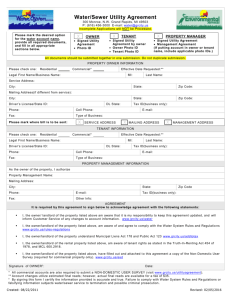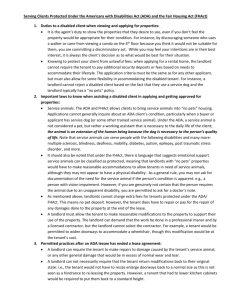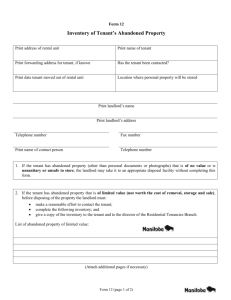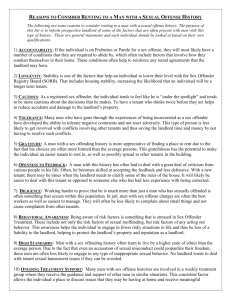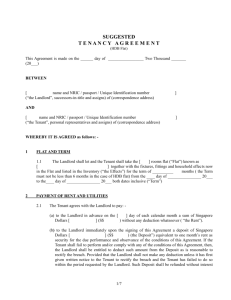housing discriminantion - JEEVAN
advertisement
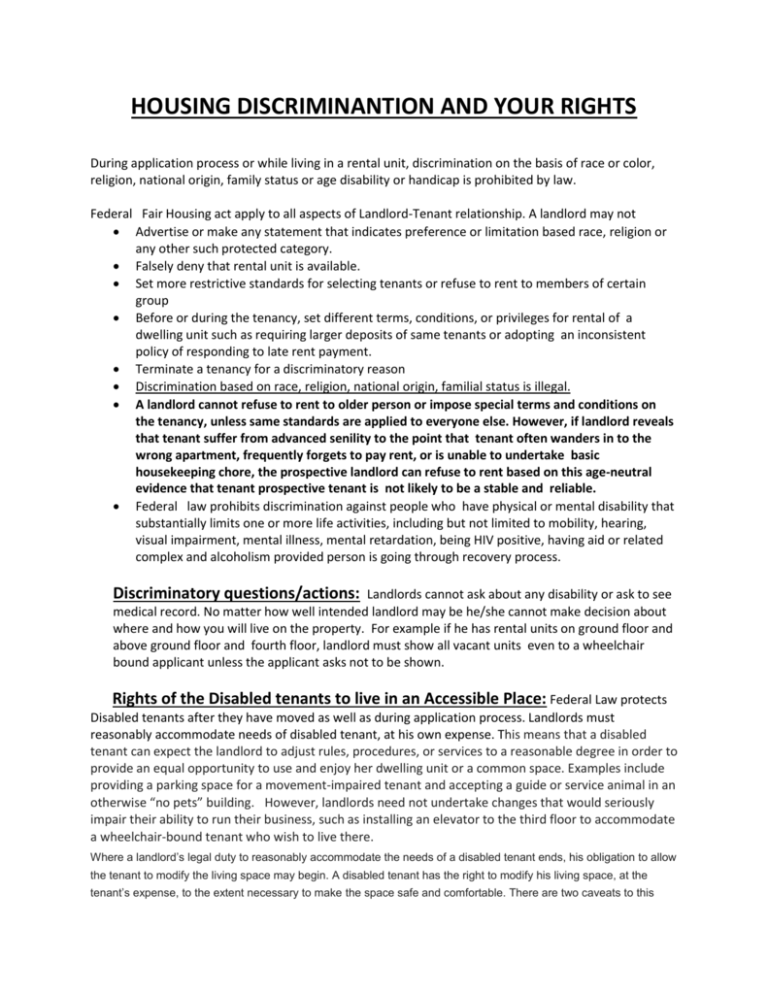
HOUSING DISCRIMINANTION AND YOUR RIGHTS During application process or while living in a rental unit, discrimination on the basis of race or color, religion, national origin, family status or age disability or handicap is prohibited by law. Federal Fair Housing act apply to all aspects of Landlord-Tenant relationship. A landlord may not Advertise or make any statement that indicates preference or limitation based race, religion or any other such protected category. Falsely deny that rental unit is available. Set more restrictive standards for selecting tenants or refuse to rent to members of certain group Before or during the tenancy, set different terms, conditions, or privileges for rental of a dwelling unit such as requiring larger deposits of same tenants or adopting an inconsistent policy of responding to late rent payment. Terminate a tenancy for a discriminatory reason Discrimination based on race, religion, national origin, familial status is illegal. A landlord cannot refuse to rent to older person or impose special terms and conditions on the tenancy, unless same standards are applied to everyone else. However, if landlord reveals that tenant suffer from advanced senility to the point that tenant often wanders in to the wrong apartment, frequently forgets to pay rent, or is unable to undertake basic housekeeping chore, the prospective landlord can refuse to rent based on this age-neutral evidence that tenant prospective tenant is not likely to be a stable and reliable. Federal law prohibits discrimination against people who have physical or mental disability that substantially limits one or more life activities, including but not limited to mobility, hearing, visual impairment, mental illness, mental retardation, being HIV positive, having aid or related complex and alcoholism provided person is going through recovery process. Discriminatory questions/actions: Landlords cannot ask about any disability or ask to see medical record. No matter how well intended landlord may be he/she cannot make decision about where and how you will live on the property. For example if he has rental units on ground floor and above ground floor and fourth floor, landlord must show all vacant units even to a wheelchair bound applicant unless the applicant asks not to be shown. Rights of the Disabled tenants to live in an Accessible Place: Federal Law protects Disabled tenants after they have moved as well as during application process. Landlords must reasonably accommodate needs of disabled tenant, at his own expense. This means that a disabled tenant can expect the landlord to adjust rules, procedures, or services to a reasonable degree in order to provide an equal opportunity to use and enjoy her dwelling unit or a common space. Examples include providing a parking space for a movement-impaired tenant and accepting a guide or service animal in an otherwise “no pets” building. However, landlords need not undertake changes that would seriously impair their ability to run their business, such as installing an elevator to the third floor to accommodate a wheelchair-bound tenant who wish to live there. Where a landlord’s legal duty to reasonably accommodate the needs of a disabled tenant ends, his obligation to allow the tenant to modify the living space may begin. A disabled tenant has the right to modify his living space, at the tenant’s expense, to the extent necessary to make the space safe and comfortable. There are two caveats to this rule: First, the landlord is not required to allow you to make major structural alterations. Second, if the modifications will make the unit unacceptable to the next tenant, the disabled tenant must agree to undo the modification when moving out. The landlord has the right to insist that the tenant put money in an escrow account to cover the eventual cost of returning the unit to its original condition. Examples of modifications undertaken by a disabled tenant include the lowering of countertops, installation of a ramp, or repositioning the light switches. Landlords are entitled to ask for proof that the accommodation or modification you have requested will address your situation—without it, your landlord has no way of knowing whether your request is legitimate or a ruse to obtain special treatment. Ask your physician, therapist, counselor, or any other third-party professional who knows you and understands your situation for a letter attesting that what you are asking for will, meet your needs. To protect your privacy, explain to the physician or other writer that there’s no need to explain the disability. The writer need only certify that you are under his or her care and that the changes you would like are appropriate to your situation. Property Exempt from Federal Antidiscrimination Laws: Not every rental is covered by the federal fair housing laws. The following types of property are exempt: owner-occupied buildings with four or fewer rental units single-family housing rented without the use of advertising or without a real estate broker, as long as the landlord owns no more than three such homes at any one time certain types of housing operated by religious organizations and private clubs that limit occupancy to their own members, and With respect to age discrimination only, housing reserved exclusively for senior citizens. There are two kinds of senior citizen housing exempted: communities where every tenant is 62 years of age or older, or “55 and older” communities in which at least 80% of the occupied units must be occupied by at least one person 55 years or older. Most state and local laws prohibiting housing discrimination echo federal antidiscrimination law. But some laws forbid additional types of discrimination—such as discrimination based on marital status— that aren’t covered by federal law. For example, in states that prohibit discrimination based on marital status, it is illegal to refuse to rent to divorced people, even though federal law does not prohibit this kind of discrimination. Condominium and Co-Op Board makes rules and regulation for the operation of condominium and co-op. If considering to purchase either of these units one should carefully examine the declaration and the by laws to see whether you can live with the various restrictions. One should pay special attention to any rights of the board of directors to limit or regulate the use of individual unit, such as prohibiting making unit barrier free, (installation of ramp), prohibit in-home care if it becomes necessary in the future. For further information please contact: Jeevan Jyoti. Inc. Jeevanjyoti.ny@hotmail.com (845)709-2216 Commissioner, Rockland Human Rights Commission Sanatorium Rd. Bldg. G Pomona, NY 10970 (845)364-3886

